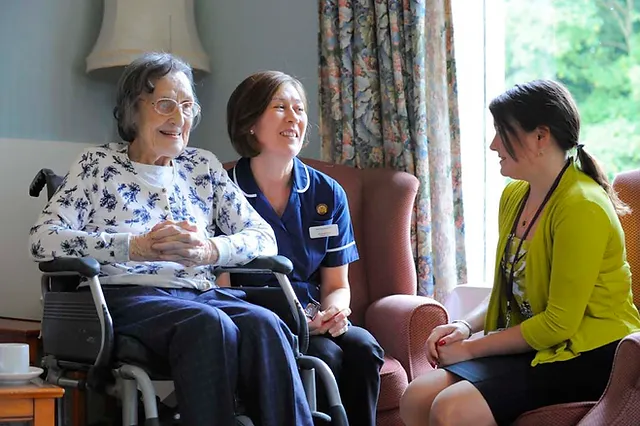As the U.S. population ages, there is a greater need for residential options for older people who may need some level of assistance. These facilities, known as assisted-living homes, residential care facilities and nursing homes, can provide basic living assistance like house cleaning and cooking, or they may provide more complete services like nursing care.
This industry is growing as the population ages, with the U.S. market expected to expand at a compound annual growth rate of 5.97% from 2022 before reaching $779.4 in the U.S. by 2030. There are numerous employment opportunities available for positions needed to staff these residential facilities. In some cases, the positions involve administrative and internal operations that may not come into contact with patients on a daily basis, such as an administrator or accounting manager. In other cases, these positions include personnel who work directly with patients, such as nurses and physical therapists.
Table of Contents
Different types of facilities that offer housing options to older people
Depending on the level of care or assistance an older person may need, there are a variety of options to consider.
Residential care facilities
These homes, also known as board and care homes, typically are small private facilities with fewer residents, usually 20 or less. They provide personal care and meals for residents, with staff available around the clock. Medical care typically is not provided.
Assisted-Living home
These facilities offer residents help with daily care, but provide individual apartments or rooms. Residents can access varying levels of care, which come at an additional cost. Residents receive meals, personal care assistance, help with medicine, housekeeping, and social and recreational events.
Nursing Homes
Nursing homes, also called skilled nursing facilities, offer assistance with both personal and medical care. The emphasis is on medical assistance, including nursing care, 24-hour supervision, rehabilitation services and other therapy. Residents also receive all the services provided by an assisted-living home.
Continuing Care Retirement Communities
These facilities offer a broad spectrum of services, ranging from independent living to intensive nursing care, all in one place. Residents of continuing care retirement communities can move into independent living quarters requiring little or no assistance, and can progress into other areas of the facility as their needs evolve, including full-time nursing care.
If you are considering a career in one or more of these types of facilities, here are some positions that typically help run and staff these homes.
Residential Care Facility Administrator
An administrator of a residential care facility for the elderly (RCFE) is an owner or top executive of the facility. There are specific requirements necessary to serve as an administrator, including RCFE certification. Other requirements include being at least 21 years old, having a high school diploma or GED, and the completion of an RCFE certification class and state exam.
Medical Staff
Some facilities that serve older populations provide medical staff to assist residents, including:
- Registered Nurses (RNs)
- Licensed Vocational Nurses (LVNs) or Licensed Practical Nurses (LPNs)
- Certified Nursing Assistants (CNAs)
- Physical Therapists (PTs)
- Nurses
Registered nurses assess the needs of residents in facilities, including nursing homes. They work with the Licensed Vocational Nurses (LVNs) and Licensed Practical Nurses (LPNs) to craft care and treatment plans for residents and ensure they are properly administered.
Many of the positions that make up the medical staff of these facilities require a state license and specific training to qualify for the license. For example, registered nurses usually must have between two and six years of education, while LPNs and LVNs typically must have a year of training.
Nursing Assistants
Certified Nursing Assistants, also known as CNAs, work under the supervision of licensed nurses. CNAs help maintain the health and well-being of patients on a daily basis. They typically assist residents with meals, hygiene, grooming and going to the bathroom.
Full-time CNAs must complete nurse assistant training or a competency evaluation program within four months of becoming permanently employed. They also must undergo continuing education every year.
Dietician
Some facilities that provide more nursing and medical assistance to residents also rely on a qualified dietician to help patients with various dietary needs. Federal law requires dietitians in nursing homes, at least on a consulting basis. These dietitians must meet federal qualifications either through registration with the American Dietetic Association’s Commission on Dietetic Registration or through some other type of training. That can include training, education, or documented experience in the determination and identification of dietary planning, needs, and operation of dietary programs in facilities.
Administration and Support Personnel
There are numerous internal positions that are focused on administration and maintenance duties on a daily basis, although these employees do not typically interact on a regular basis with residents and patients of these facilities. The size of the administrative and support staff will depend on how many residents the facility can accommodate. In larger complete-care facilities like nursing homes, these employees can range in the number of a few dozen working in separate departments, including accounting, maintenance, and human resources.
A number of positions also handle various maintenance of the facilities, including support workers who serve in maintenance, custodial services, and landscaping. These employees are responsible for maintaining the functioning and appearance of the facilities serving older residents and patients. Other support employees can include positions like activities coordinator and special events planner, which can arrange special trips for residents, regular shopping experiences, and entertainment at the facility.
Other positions include human resources staff who help seek and interview candidates for openings at the facilities; accounting staff who help manage the facility’s finances; and secretaries and assistants who serve facility administrators and help various departments complete required paperwork and documentation for the different governmental agencies that regulate the facilities.



















